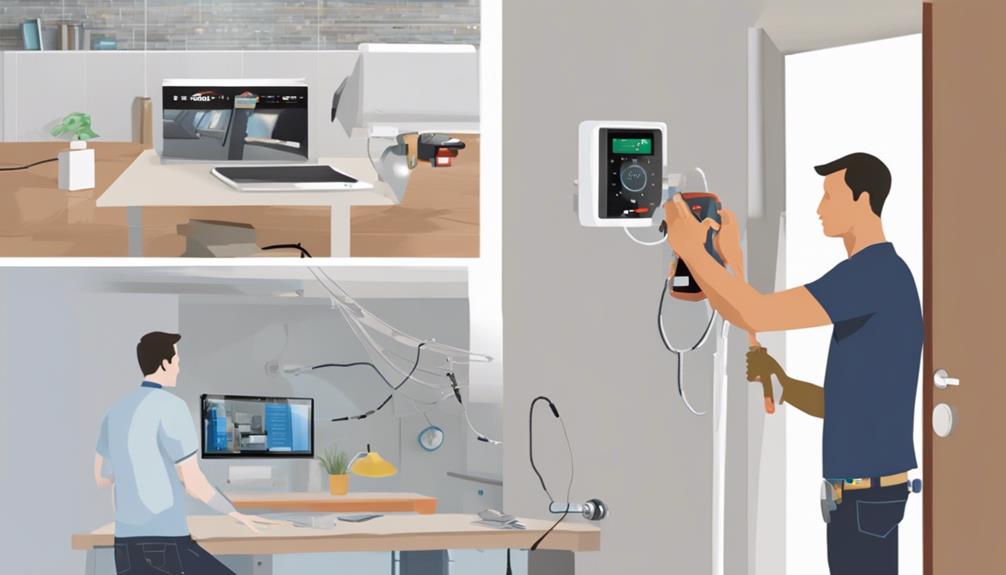Choosing between a DIY and professional security system installation depends on your budget and preferences. DIY systems cost a few hundred dollars and avoid labor fees but demand your time and tech skills. Professional installations range from $500 to over $1,500, offering expert setup and potentially saving you on long-term maintenance. Monthly monitoring for DIY can be as low as $10, while professional services range from $30 to $60. DIY options grant greater control and lower initial costs, but professional setups deliver peace of mind and reliability. For more insights on balancing cost with convenience, explore the full comparison.
Key Takeaways
- DIY systems have lower upfront costs, starting around $200 for basic packages.
- Professional systems cost more, with installations between $500 and $1,500 plus advanced equipment priced from $500 to $2,000+.
- DIY installations avoid labor fees but may require significant time investment and tech skills.
- Professional monitoring charges $30 to $60 monthly, while DIY options range from $10 to $30 or offer self-monitoring for free.
- Professional systems often include maintenance and warranties, potentially reducing long-term expenses compared to DIY.
Upfront Costs
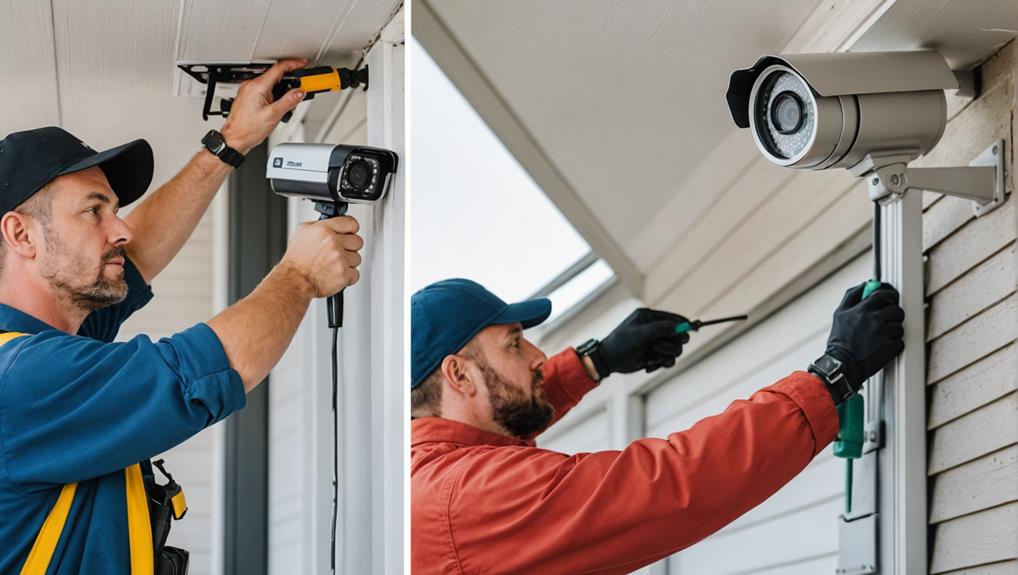
When considering a security system, upfront costs are a critical factor. You want to ascertain your investment not only protects your property but also aligns with your budget.
DIY security installation costs are generally lower because you avoid labor fees. You can often purchase a DIY kit for a few hundred dollars, depending on the complexity and number of devices. Furthermore, DIY security systems can be a good option for those who are comfortable with technology and enjoy hands-on projects.
On the other hand, professional security installation costs can be considerably higher. These services often include a thorough assessment of your property, expert installation, and sometimes even a maintenance plan. While you might spend more initially—often ranging from $500 to over $1,500—the expertise and peace of mind can be worth it.
In cost comparison, DIY options might appeal to those who are tech-savvy and enjoy hands-on projects. However, if you're focused on serving others, like guaranteeing a safe space for family or community members, professional installation could offer a more robust and reliable solution.
It's crucial to weigh the DIY security installation costs against the professional security installation costs to determine what best meets your needs and values. Your choice should reflect your commitment to creating a secure and welcoming environment.
Equipment Prices
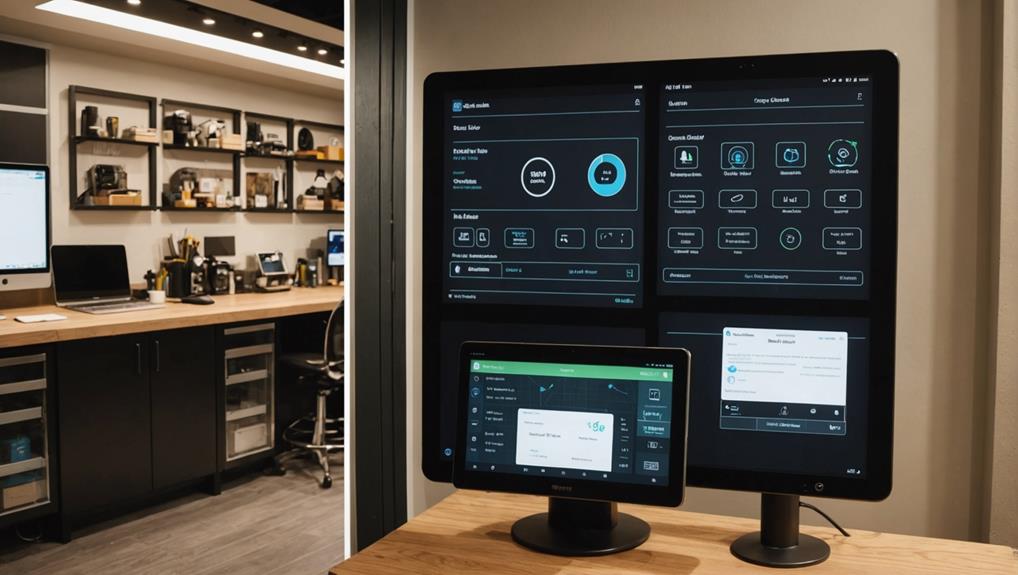
Evaluating upfront costs is just the beginning; the price of the equipment itself can considerably impact your decision between DIY and professional security systems. When you're installing security systems, the equipment is a significant part of your budget.
DIY systems often come with lower equipment costs, making them an attractive option for budget security installation. You can find basic packages starting as low as $200, which might include cameras, sensors, and control panels. For more insights on affordable security devices, you can explore a variety of DIY options that fit within a homeowner's budget.
However, professional systems typically offer more advanced technology, such as higher-resolution cameras and integrated smart home features. These enhancements can provide greater peace of mind but come with a heftier price tag, often ranging from $500 to $2,000 or more.
When comparing DIY and professional options, it's crucial to evaluate long-term security expenses. DIY equipment might seem cheaper initially, but you may incur additional costs if you need to upgrade or replace components frequently.
Professional systems usually include warranties and maintenance services, potentially saving you money over time.
Ultimately, your choice should align with your commitment to serving others and ensuring their safety. Weigh the immediate savings of DIY against the thorough protection and possible long-term savings offered by professional systems.
Installation Fees
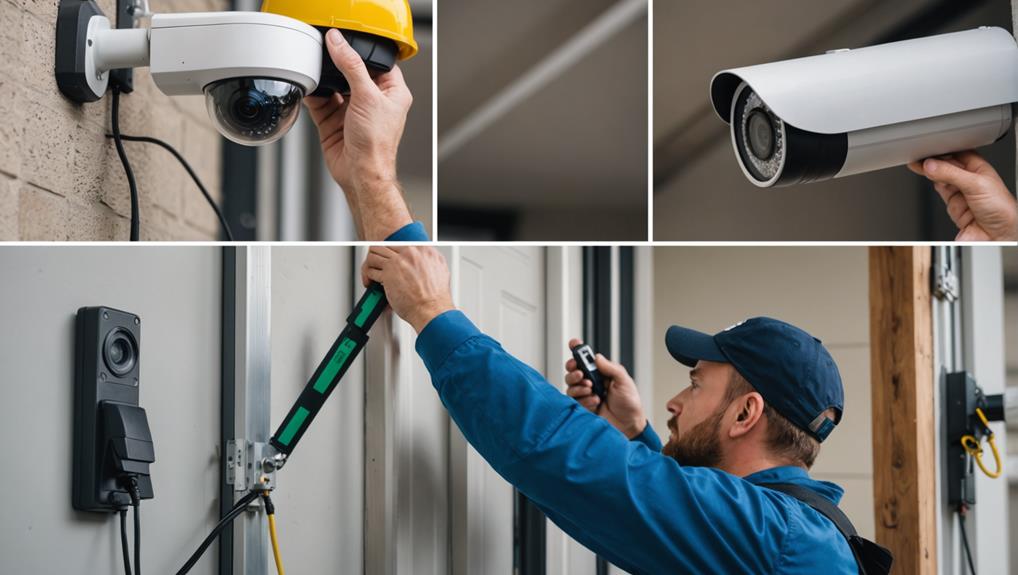
Installation fees can greatly influence your decision between DIY and professional security system installations. If you're someone who enjoys helping others and wants to keep your home or community safe, understanding these costs is vital.
Furthermore, it's worth noting that DIY systems often have flexible, scalable options that can grow with your needs.
When you go the DIY route, you can save a significant amount of money. Most DIY systems are designed for easy installation, requiring only basic tools and a bit of patience. You'll avoid the hefty fees that professionals charge, which can range from $100 to $500, depending on the complexity of the setup.
Plus, you have the satisfaction of knowing you installed it yourself.
On the other hand, professional installation provides peace of mind. Trained technicians guarantee every component is correctly placed and functioning, which can be especially beneficial if you're not tech-savvy.
While you'll pay more upfront—installation fees typically add up to a few hundred dollars—this option saves you time and reduces the risk of errors.
Ultimately, your choice hinges on your budget and comfort level with technology. If you're confident in your abilities, DIY might be the way to go.
However, if you prefer a seamless, no-hassle experience, opting for professional installation could be worth the investment.
Monitoring Expenses
When you're comparing DIY and professional security systems, don't overlook monitoring expenses.
Monthly subscription costs can add up, but self-monitoring options might help you save in the long run.
Additionally, consider the ongoing costs involved in maintaining your system, such as equipment updates and repairs.
Weighing these factors can guide you toward the best financial choice for your needs.
Monthly Subscription Costs
An essential factor to evaluate when choosing between a DIY and a professional security system is the monthly subscription costs for monitoring services. These costs can vary markedly based on the type of system you choose and the level of monitoring you require.
For those who value continuous support and quick response times, professional monitoring services often charge around $30 to $60 per month. This fee covers 24/7 monitoring by trained professionals who can dispatch emergency services when needed.
On the other hand, DIY systems usually offer more budget-friendly options, with monthly fees ranging from $10 to $30. While these services also include professional monitoring, they often come with fewer bells and whistles compared to their professionally installed counterparts.
However, they still provide peace of mind by ensuring your home is monitored around the clock. It's important to reflect on your budget and the level of security you desire.
If you're committed to serving others, like ensuring the safety of your family or community, investing in a reliable monitoring service is vital. By carefully weighing these monthly costs, you can make a decision that best aligns with your financial situation and security needs.
Self-Monitoring Options
For those looking to cut down on ongoing expenses, self-monitoring options can be an attractive alternative to traditional monitoring services. By taking charge of your home security, you can eliminate monthly fees while still keeping your property and loved ones safe.
This option suits individuals who want to stay actively involved and are comfortable using technology to monitor their systems.
When you choose to self-monitor, you'll get several benefits:
- Cost Savings: You won't incur monthly fees, making it easier on your budget.
- Real-Time Alerts: Receive instant notifications on your smartphone, allowing you to respond quickly.
- Customization: Tailor alerts and settings to suit your specific needs and preferences.
- Control: Maintain full control over who accesses your security system and how it operates.
- Flexibility: Easily upgrade or adjust your system without needing to contact a service provider.
Taking the self-monitoring route empowers you to be the first line of defense for your home.
It's a proactive and cost-effective way to guarantee security while serving the best interests of those you care about.
Long-Term Savings
Cutting down on monitoring expenses can lead to significant long-term savings for homeowners. When you choose a DIY security system, you often have the flexibility to select a self-monitoring option. Unlike professional systems that come with monthly monitoring fees, DIY systems empower you to keep an eye on your home without those recurring costs. This not only keeps more money in your pocket but also allows you to allocate resources towards other priorities.
Opting for self-monitoring doesn't mean compromising on security. Many DIY systems provide real-time alerts and remote access via smartphone apps, giving you control and peace of mind. With professional monitoring, you're often locked into contracts that can last years, adding up to thousands of dollars. By comparison, DIY systems typically offer optional monitoring services, so you only pay for what you need.
Moreover, the savings from lower monitoring expenses can be redirected towards community-serving initiatives or family needs. Imagine using that extra cash for local charities or enhancing your home's energy efficiency.
In the long run, a DIY security system not only safeguards your home but also supports your commitment to making a positive impact.
Maintenance Costs
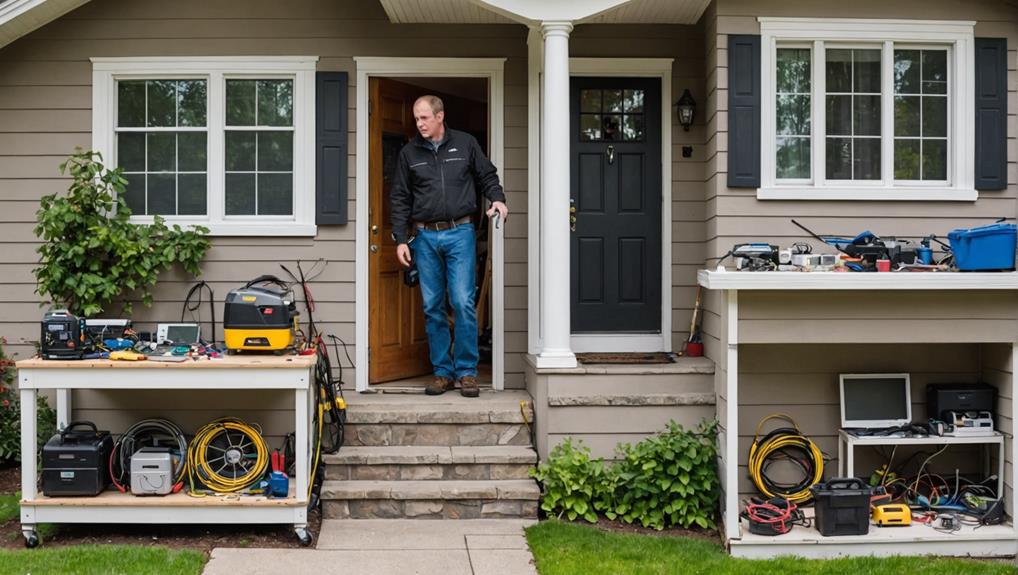
Whether you choose a DIY or professional security system, maintenance costs can greatly impact your budget over time.
DIY systems often require you to handle upkeep yourself, which can save money if you're handy but might lead to unexpected expenses if issues arise. On the other hand, professional systems usually include service packages that cover routine maintenance, but these come at a recurring fee. This can be particularly beneficial for those who lack technical expertise or time to handle maintenance themselves.
For those who value serving others, it's important to evaluate these costs carefully to guarantee you can continue supporting your household or community without financial strain.
Here are some maintenance-related factors to take into account:
- Replacement Parts: DIY systems may require you to buy parts individually, while professional services often include them in their maintenance plans.
- Time Investment: Maintaining a DIY system demands your time and effort, which could detract from other responsibilities.
- Technical Expertise: DIY maintenance might require technical skills, whereas professional services handle it for you.
- Emergency Repairs: Professionals usually offer quicker emergency repair services, reducing downtime.
- Regular Inspections: Routine check-ups can be scheduled with professional systems to verify everything is functioning correctly.
Warranty and Support
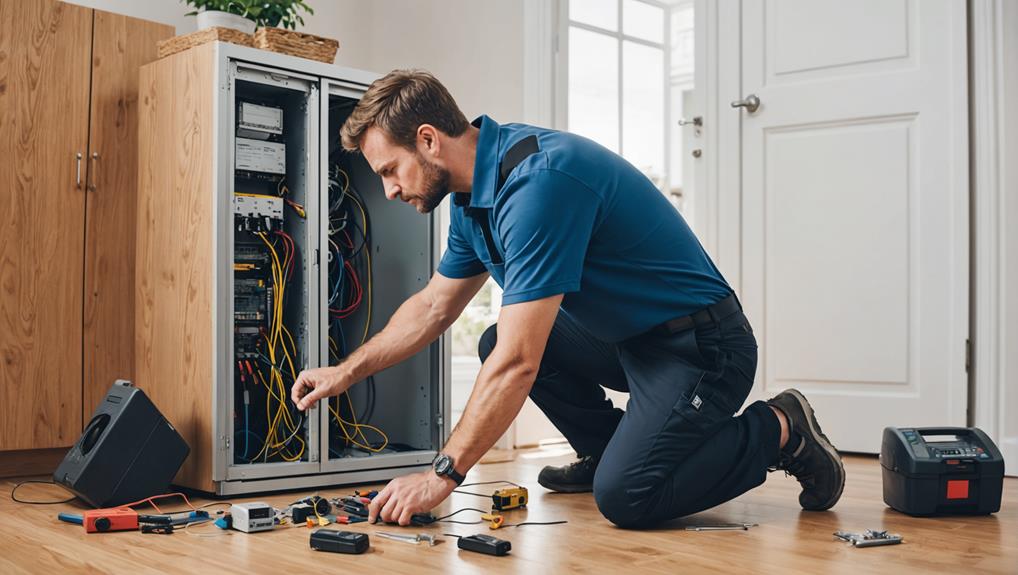
When comparing DIY and professional security system installations, you need to take into account the warranty and support options.
Professional installations often come with more extensive coverage and longer durations, making claim processes easier.
Additionally, support availability times can vary greatly between DIY and professional services.
This is particularly important in emergencies or when immediate assistance is required, as professional services often offer 24/7 support.
Coverage and Duration
Many homeowners find that coverage and duration of warranties and support are essential factors when choosing between a DIY and a professionally installed security system.
You want to guarantee your investment is protected and that help is readily available when needed.
DIY systems often come with limited warranties and support. Typically, you might get a one-year warranty and basic customer service.
In contrast, professional installations usually offer more extensive coverage and extended support. Here are a few key points to evaluate:
- Warranty Duration: Professional systems often provide longer warranties, sometimes up to 3-5 years, compared to the standard one-year for DIY setups.
- Technical Support: With professional installations, you're likely to receive 24/7 customer support, whereas DIY systems might only offer limited hours.
- Replacement Policies: Professionals may offer quicker and more generous replacement policies if a component fails.
- Maintenance Services: Some professional companies include routine maintenance checks as part of their package, guaranteeing your system remains in prime condition.
- Expert Troubleshooting: In case of issues, professional services typically provide expert technicians to resolve problems efficiently.
Claim Process Ease
Evaluating the ease of the claim process is another important aspect when choosing between a DIY and a professionally installed security system. When you've got a heart for serving others, you don't want to be bogged down with a complicated or lengthy warranty claim process.
With DIY systems, you'll often find that warranty claims are more streamlined. The manufacturers typically offer user-friendly online portals where you can quickly submit your claim. However, you're usually responsible for troubleshooting and determining if an issue qualifies for a warranty claim. This can eat into your valuable time that you'd rather spend helping someone else.
On the other hand, professional security systems usually come with the added benefit of extensive customer support. When something goes wrong, you can contact a dedicated support team that will handle most of the legwork for you.
They'll often dispatch a technician to assess and resolve the issue, making the process smoother for you.
Support Availability Times
Support availability times can make or break your experience with a security system, especially during emergencies. When you're choosing between a DIY setup and a professional installation, it's important to evaluate how quickly and effectively you can get help when you need it most.
For those who take pride in serving others, ensuring safety and security is a top priority. Here's what you need to know:
- 24/7 Support: Professional systems often provide round-the-clock support, so you can reach someone anytime a problem arises.
- Response Time: Professionals typically guarantee faster response times, which can be critical in urgent situations.
- Warranty Coverage: Most professional installations come with thorough warranties that cover repairs and replacements, giving you peace of mind.
- Expert Assistance: Trained technicians are available to diagnose and fix issues, ensuring your system is always functioning at its best.
- DIY Limitations: While DIY systems can save money, they often lack extensive support options, leaving you to troubleshoot issues on your own.
Choosing the right support structure is fundamental for maintaining a secure environment.
Whether you go DIY or professional, knowing the level of support you can count on will help you make an informed decision that best serves the safety of those you care about.
Time Investment
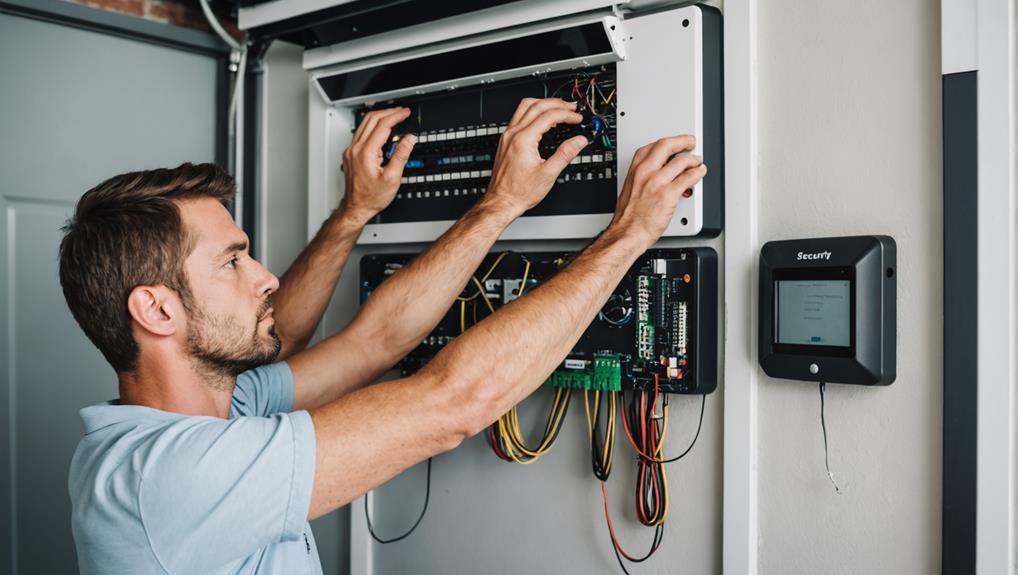
When considering the time investment for a security system installation, it is crucial to weigh the differences between DIY and professional options. Installing a system yourself can be rewarding, but it also demands significant time, especially if you're unfamiliar with the technology. On the other hand, professional installation might require scheduling and waiting for technicians, but it typically guarantees a quicker, more hassle-free setup.
Here's a quick comparison to help you decide:
| Factor | DIY Installation | Professional Installation |
|---|---|---|
| Time to Research | High | Low |
| Installation Duration | Varies (several hours to days) | Quick (a few hours) |
| Potential Delays | High (due to learning curve) | Low (experienced techs) |
| Immediate Availability | Yes (start anytime) | No (schedule required) |
As someone who aims to serve others, your time is valuable. DIY installation allows you to start right away and might be cost-effective, but it requires a substantial time commitment to learn and execute properly. Conversely, opting for professional installation could save you time and guarantee the system is set up efficiently and correctly, allowing you to focus on other important tasks. Choose the option that best fits your schedule and technical comfort level.
Customization Options
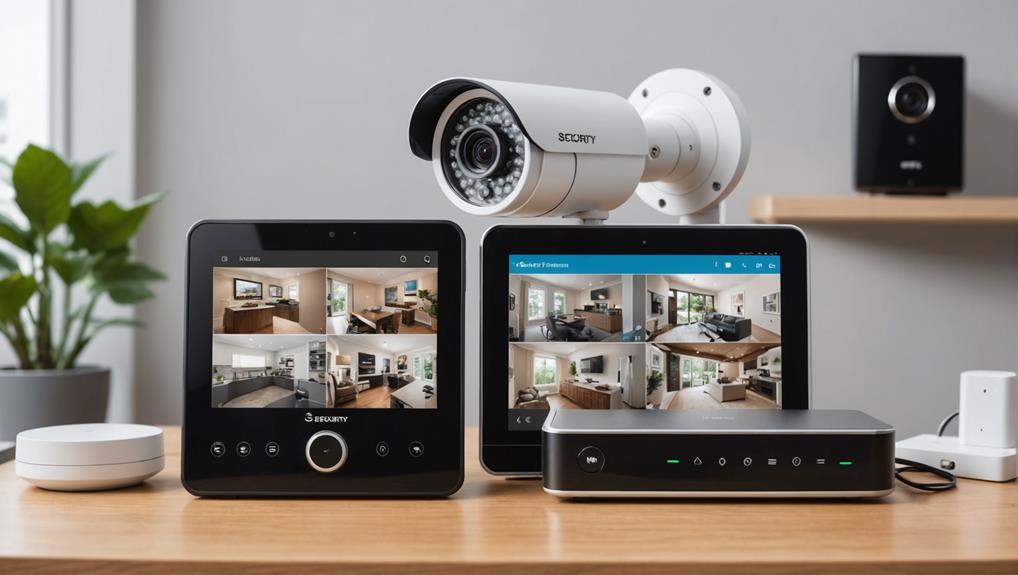
Everyone wants a security system that fits their unique needs, and customization options can make a big difference. When you're choosing between DIY and professional installation, it's crucial to evaluate how customizable the system is.
DIY systems usually offer flexibility, allowing you to pick and choose components that fit your specific requirements. Additionally, DIY installations can often be more cost-effective, as they eliminate the added expense of professional labor.
On the other hand, professional installations often come with expert advice, guaranteeing that every corner of your home is covered. This means that you can rely on expert advice to guarantee ideal coverage and efficiency.
Here are some customization options to reflect on:
- Component Selection: Choose sensors, cameras, and alarms tailored to your home's layout and security needs.
- Integration: Sync your system with smart home devices like lights, locks, and thermostats for seamless operation.
- Scalability: Easily add more components as your security needs grow or as your budget allows.
- Monitoring Options: Opt for self-monitoring or professional monitoring based on your comfort and availability.
- User Access: Customize access levels for family members, caregivers, or other trusted individuals.
Long-term Savings
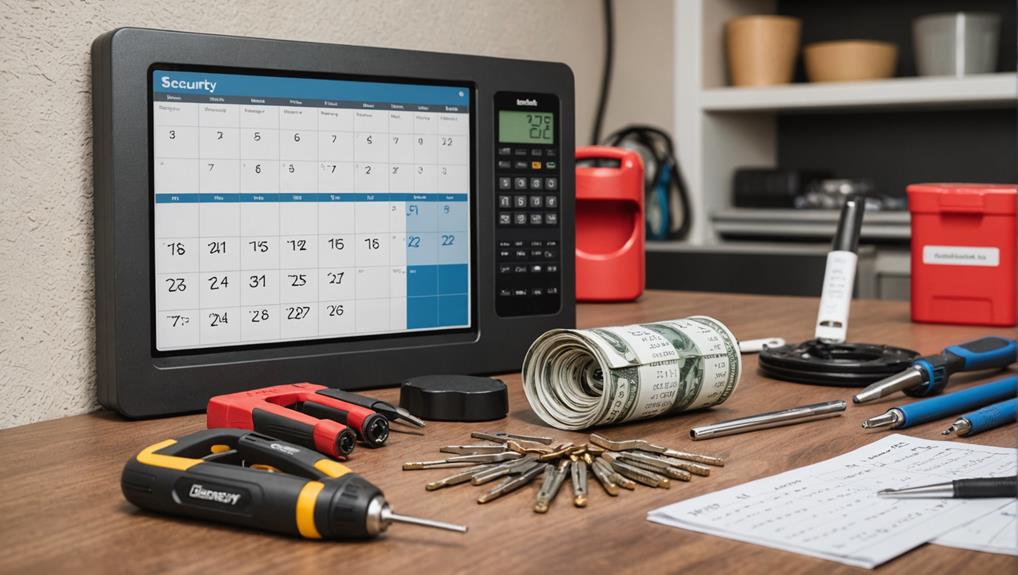
Investing in a security system isn't just about the upfront costs; it's about the long-term savings you can achieve. When you choose between a DIY and a professional installation, consider the potential for future financial benefits. DIY systems often have lower monthly fees and no contracts, which can lead to significant savings over time. Meanwhile, professionally installed systems might come with higher monthly monitoring fees but offer robust features that can save you money on insurance premiums.
Here's a quick comparison:
| Feature | DIY System | Professional System |
|---|---|---|
| Initial Cost | Generally Lower | Generally Higher |
| Monthly Fees | Lower | Higher |
| Insurance Discounts | Moderate | Significant |
| Maintenance Costs | Personal Responsibility | Often Included |
DIY systems empower you to manage your security setup, potentially saving you on service calls and maintenance. On the other hand, a professional system can offer higher insurance discounts due to its reliability and thorough coverage.
Frequently Asked Questions
How Reliable Are DIY Security Systems Compared to Professional Installations?
When you're deciding between DIY and professional security systems, reliability is key.
DIY systems can be quite reliable if you follow instructions carefully and choose reputable brands.
However, professional installations often come with expert knowledge and ongoing support, ensuring everything works seamlessly.
If serving others is your priority, a professional system might give you peace of mind, knowing your loved ones are protected by top-tier security.
Can DIY Systems Integrate With Existing Smart Home Devices?
Yes, DIY systems can integrate with your existing smart home devices.
Most modern DIY security systems are designed to be user-friendly and compatible with popular smart home platforms. You can sync them with devices like smart lights, locks, and thermostats.
What Level of Technical Skill Is Required for a DIY Installation?
For a DIY installation, you don't need to be a tech expert, but having basic technical skills helps.
If you're comfortable following instructions, using tools, and connecting devices, you should be fine. Many systems come with step-by-step guides or online tutorials to assist you.
Your willingness to learn and help others feel secure is key. Embrace the challenge, and you'll provide a safer environment for those you care about.
Are There Hidden Costs Associated With DIY Security Systems?
Yes, there are hidden costs with DIY security systems.
You might need extra tools or equipment, and don't forget about time investment. If a problem arises, you'll spend time troubleshooting instead of helping others.
Additionally, you could face potential repair costs if something goes wrong.
While DIY can save money initially, consider these factors to guarantee you're not sacrificing your ability to serve others effectively.
How Does the Quality of Customer Service Differ Between DIY and Professional Setups?
When it comes to customer service, professional security setups usually offer more reliable support.
You'll get access to 24/7 assistance, ensuring immediate help in emergencies.
DIY systems, on the other hand, often rely on online resources and limited phone support.
If you enjoy helping others feel secure and valued, choosing a professional setup can enhance your ability to provide prompt, dependable service to those in need.
Conclusion
When choosing between DIY and professional security system installation, consider your budget, time, and customization needs. DIY options often save you money upfront but require more hands-on effort and maintenance. Professional installations come with higher initial costs but offer extensive support and reliability. Weighing these factors will help you decide which route provides the best long-term value and peace of mind. Ultimately, it's about finding the right balance for your specific security needs.

